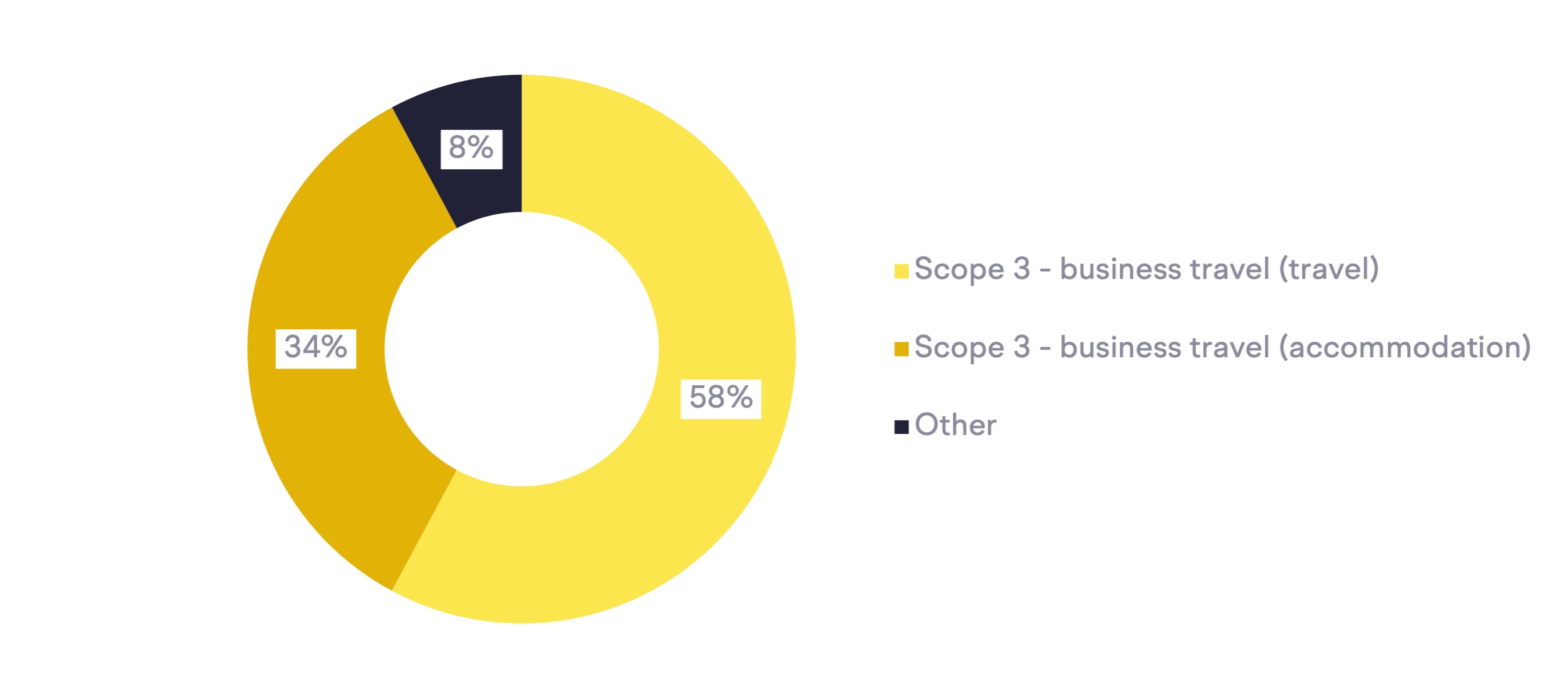Business Consulting and Services - the impact of business travel on your carbon footprint

Do you work in the Business Consulting and Services industry? As an industry where client relationships and winning work is key, making sure your company is taking sustainability seriously is increasingly important. As global awareness of climate change grows, consumers and investors increasingly favour companies with strong sustainability practices. Businesses that set and achieve science-based net zero targets can differentiate themselves in the market, attracting environmentally conscious customers and investors.
On average, 92% of your carbon footprint will be from business travel
The carbon footprint of a company in the business consulting and service industry is primarily composed of business travel, energy consumption and waste generation. As a people orientated business, travel in particular, contributes significantly to the overall footprint due to flights, ground travel, and accommodation.
Carbon Footprint of an Example SME in the Business Consulting and Services Industry

Note – this is an SME who does not travel internationally, i.e. minimal international flights. If you travel internationally, this will significantly increase the carbon footprint of your business travel.
How to reduce your carbon footprint from business travel, energy consumption and waste generation
Make responsible choices in business travel
- Have virtual meetings where possible.
- Encourage use of public transport and carpooling (Route Zero is a great tool to compare the carbon footprint of journeys).
- Direct flights: if air travel is necessary, choose direct flights to minimise layovers and reduce the overall carbon emissions associated with take-off and landing.
- Green vehicle rentals: if renting a vehicle is necessary, choose fuel-efficient, hybrid, or electric vehicles (we’re planning to try Green Motion for our next trip).
- Efficient trip planning: consolidate trips and plan efficient itineraries to minimise the amount of travel needed.
- Sustainable travel policies: develop and implement company-wide sustainable travel policies to guide employees in making eco-friendly choices and promote a culture of sustainability.
- Book eco-friendly accommodation: book environmentally conscious hotels or shared accommodation, like Airbnbs, that have lower emissions. To help you book environmentally conscious hotels, Staze is a platform that helps companies make net zero hotel bookings. Using Staze you can compare the carbon emissions of different hotels, just as you would compare their prices. Every booking made through Staze is offset for free, which means the platform invests in carbon reduction projects to counterbalance the emissions generated by your stay. Companies using Staze have reduced their emissions from hotel bookings by up to 70%.
Optimise your energy use
- Improve energy efficiency with LED lighting, smart thermostats, and efficient appliances.
- Enhance building design and insulation to reduce heating and cooling demand (we would recommend looking at the UK Green Building Council as a source of useful information).
- Switch to renewable energy sources, such as solar, wind, or hydroelectric power.
- Upgrade and maintain efficient HVAC (heating, ventilation and air-conditioning) systems.
- Foster employee awareness and engagement in energy-saving practices (we love the work our friends at Clever Carbon do on how to engage employees in sustainable practices).
- Implement energy management systems to track and optimise energy usage (take a look at Metrikus).
- Promote virtual meetings and remote work to save energy.
- Practice green procurement by selecting sustainable suppliers and partners.
Minimise your waste
- Reduce: minimise waste generation by using fewer resources and avoiding unnecessary packaging materials.
- Reuse: implement practices that promote reusing items, such as using refillable containers and repurposing materials (take a look at Club Zero).
- Recycle: set up recycling programs for paper, plastic, glass, and metal waste, and educate employees on proper recycling practices.
- Compost: establish composting systems for organic waste, such as food scraps, to reduce methane emissions from landfills.
- Digitise: reduce paper waste by transitioning to digital documents, communication, and record-keeping.
- Efficient inventory management: optimise inventory management to minimise waste of perishable items.
- Sustainable procurement: purchase products made from recycled or sustainably sourced materials, and prioritise suppliers with eco-friendly waste management practices (IT equipment can be a big source of carbon emissions for businesses, check out Klyk for sustainable IT solutions).
- Waste audits: Conduct regular waste audits to identify areas for improvement and monitor waste reduction progress.
- Collaborate with waste management partners: work with local waste management companies to ensure the proper disposal and recycling of waste materials (we love the work B-Corp Recycling Lives do).
Your next steps
To show your company is serious about sustainability and not simply using it as a buzzword, we recommend starting by measuring your carbon footprint (we used our friends at Zellar) and setting a science-based net zero target. By making conscious choices in business travel, energy consumption and waste management by using platforms like Staze, you can significantly lower your environmental impact.

